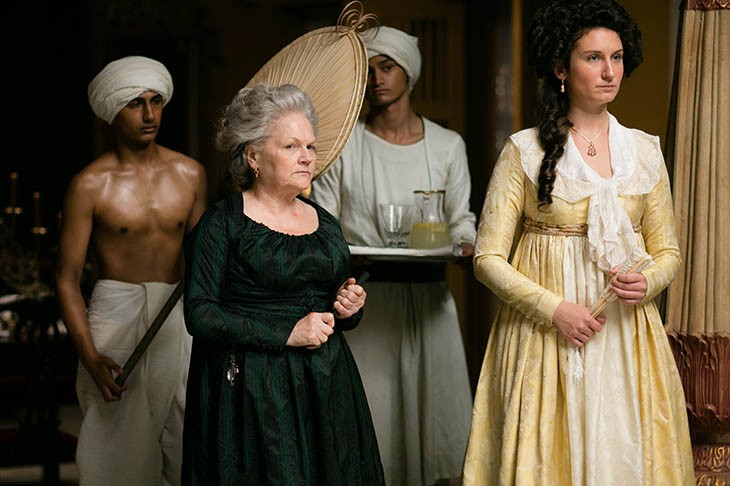ITV’s new drama Beecham House is set in late 18th-century India where the British and French were still battling it out for supremacy. Its opening credits feature the east at its most exotic, with a montage of ceremonial elephants parading, sari-clad women gliding and lotus flowers opening. The hero is John Beecham (Tom Bateman), a hunky Englishman who proves honourable to the point of mild priggishness as he navigates his way through a world of dusky beauties, inscrutable orientals and treacherous Frenchies. If there were any Indians around at the time who weren’t gorgeously attired rich people, violent bandits or servants who took real pride in their work, we’ve yet to meet them.
All in all, then, it’s just as well that the series is produced, directed and co-written by Gurinder Chadha, the maker of Bhaji on the Beach and Bend It Like Beckham. Otherwise, it might be quite hard to accept the idea that this is a radical piece of work designed to undermine the usual stereotypes of the Brits in India. At times, in fact, we might even think that it’s a bit corny.
Certainly, there doesn’t seem anything very radical about the dialogue. On the whole, everybody here speaks in the kind of ornate sentences that are the dramatic equivalent of purple prose. They constantly help us out by explaining the historical background we need, or by providing handy character summaries of the people we’re about to meet (‘Begum Samru is not to be underestimated. She is a favourite of the emperor who treats her like his own daughter’). When particularly angry, they end conversations with a brusque ‘I bid you good day’.
In Sunday’s first episode, a brief pre–credit sequence established Beecham’s nobility by showing him saving a group of gorgeously attired rich Indians from an attack by violent bandits. After the credits, we cut to three years later when a group of servants excitedly awaited the arrival of their new master at a beautiful Delhi mansion. The fact that Beecham then showed up with a mixed-race baby he obviously loves was presumably meant to be one of those stereotype-undermining moments. And yet, of course, it only made him seem even more Englishly honourable — especially as he was so keen to protect the mother’s identity. And with that, pausing only for the mandatory topless-gardening scene, he got on with the business of setting up an impressive number of plots.
Like the pillar of virtue he is, Beecham tells more or less everyone he sees that ‘India belongs neither to the British nor the French’ — and just in case that’s not clear enough, that it ‘should be ruled by Indians’. Unlike the despicable East India Company for which he once worked, he’s not seeking to conquer, simply to trade. But will Delhi’s undeniably inscrutable Mogul emperor believe him — especially when Beecham’s rival for the imperial ear is the obsessively Anglophobic French mercenary General Castillon (Grégory Fitoussi)?
For a while, Beecham’s case wasn’t helped by his considerably less priggish, even hunkier and, later, even more topless brother Daniel (Leo Suter) being a soldier for the East India Company. Luckily, though, in the second episode he was able to track Daniel down (to a brothel, as it happens), give him a stern lecture on the error of his ways and bring him back to the mansion. (Oddly for a programme that feels like an almost defiantly classic example of a Sunday-night drama, Beecham House continued this week on Monday. From now on, it reverts to Sundays only.)
By this time, Beecham was also having difficulties with women. As he expected, his mother had shown up from England — and, as we expected, she was soon bossing the servants around and complaining about the heat. Awkwardly, however, she’d brought him a prospective English wife, shortly after he’d fallen for the only other English-woman around. This is the spirited Miss Osborne (Dakota Blue Richards), a governess he’d spotted at a sumptuous garden party hosted by his Indian neighbour. Or, as the neighbour chucklingly put it, ‘In a garden full of beautiful flowers, I see your eyes have rested on the only English rose.’
Beecham House certainly looks lovely, in a way that makes the adjective ‘lush’ annoyingly hard to avoid. The cast look pretty good too (like all recent male stars of Sunday-night dramas, Bateman is being talked of as the next James Bond) and, to their credit, manage to deliver lines like the one above without giggling. Yet, having found a period of Indian history that hasn’t been done to television death already — and having made those promises that we were in for something genuinely fresh — the programme should surely be doing more with it than this: an intermittently enjoyable but ultimately pretty shameless soap opera.






Comments